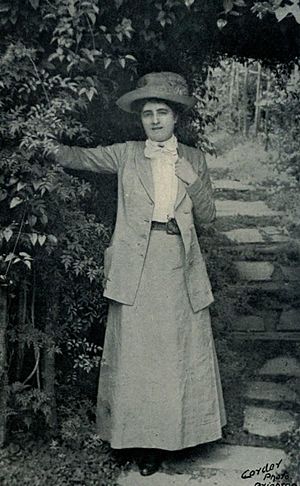Frances Garnet Wolseley, 2nd Viscountess Wolseley facts for kids
Frances Garnet Wolseley, 2nd Viscountess Wolseley (born September 15, 1872 – died December 24, 1936) was an English writer and teacher. She taught people about gardening. Frances started a special school called Glynde College for Lady Gardeners. This school was in East Sussex, England. Famous gardeners like Gertrude Jekyll and William Robinson supported her college.
Contents
Early Life and Family
Frances Wolseley was born in Pimlico, London, in 1872. Her father was Sir Garnet Wolseley, a British Army officer. Her mother was Lady Wolseley. Frances was their only child.
Her father's job meant the family moved often. Frances grew up in different homes. She even visited her father in places like Cyprus and Cairo. She enjoyed spending time with her father.
Frances had a private education at home. It was not always steady because her family moved so much. She later wrote that she was taught to become a good wife. However, her father wanted her to be active in society. He even started a Girls' Debating Society for her and her friends. This helped them learn to speak in public.
Starting a Gardening Career
Frances preferred country life over city parties. This became possible when her family moved to Glynde village in 1899. There, she found a walled garden. She started to grow plants and learn more about gardening.
In 1902, Frances began teaching gardening. She created a course for young women. These women wanted to earn their own living. She also hoped women could use these skills in other parts of the British Empire. This included places like Australia and South Africa.
Frances had some disagreements with her parents. They moved to France in 1904. Her parents rented out their house, which included a greenhouse. Frances needed this greenhouse for her teaching. She managed to raise money to rent it back.
Her gardening college became very popular. In 1907, it moved to a larger teaching garden. This new place had student housing. The college offered a two-year course. It had high standards for its students. Famous gardeners like Gertrude Jekyll supported the college. Frances ran the college with strict rules. She wanted her students to be very professional.
Promoting Women in Horticulture
Frances Wolseley eventually spent less time running the college. She wanted to promote gardening to more women. She traveled around the country. She visited successful gardening businesses. She also saw other gardening colleges and private gardens run by women.
She even traveled to Canada and South Africa. She was interested in bringing Canadian women's ideas to the United Kingdom. In 1908, she wrote a book called Gardening for Women. This book suggested how women could help the countryside economy.
Frances believed women were strong and capable. She did not think women were weak. However, she was not fully sure about women's suffrage. This was the movement for women to get the right to vote. She did not actively support it.
In 1913, Frances became a member of the Worshipful Company of Gardeners. This was a special group for gardeners in London. When her father died in 1913, Frances inherited his title. She became Viscountess Wolseley. She then moved to Massetts Place in Lindfield, West Sussex.
Later Works and Legacy
Frances wrote her most important book, Women on the Land, in 1916. This book talked about small farms. It also discussed how women's groups could work together. It even suggested gardening as a school subject.
Other books she wrote include In a College Garden (1916). This book described the work at her college. She also wrote Gardens, their Form and Design (1919). This book helped start the field of landscape architecture.
In 1920, she moved to Culpepers in Ardingly, West Sussex. Her later books were mostly about local history.
Death and Bequest
Viscountess Wolseley died on December 24, 1936. She passed away at Culpepers in Ardingly, Sussex. She had been ill for a long time. She was buried at St Andrew's Church in Beddingham, East Sussex.
Frances left her books and papers to Hove Corporation. She also left money to improve the library. A special Wolseley Room was set up there. These materials are still kept in Hove Library.
Frances Wolseley never married or had children. Because of this, her family title ended when she died.


